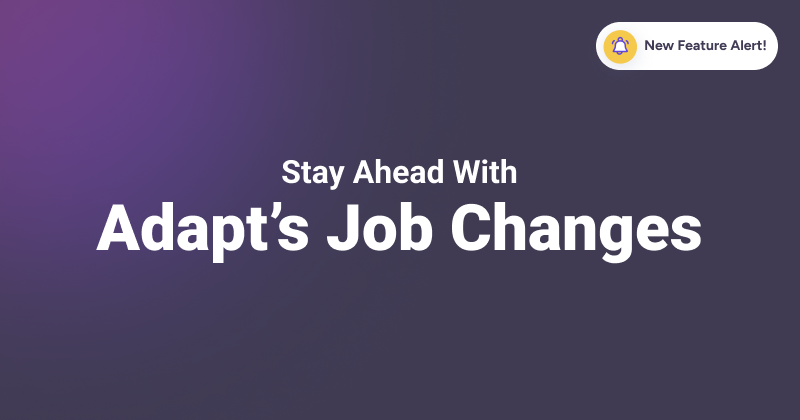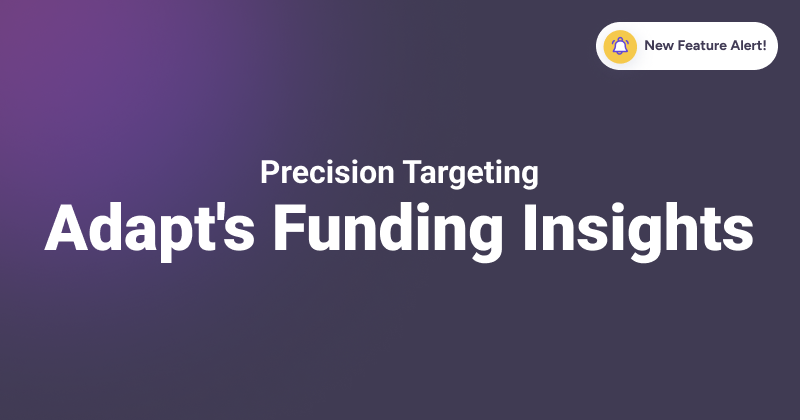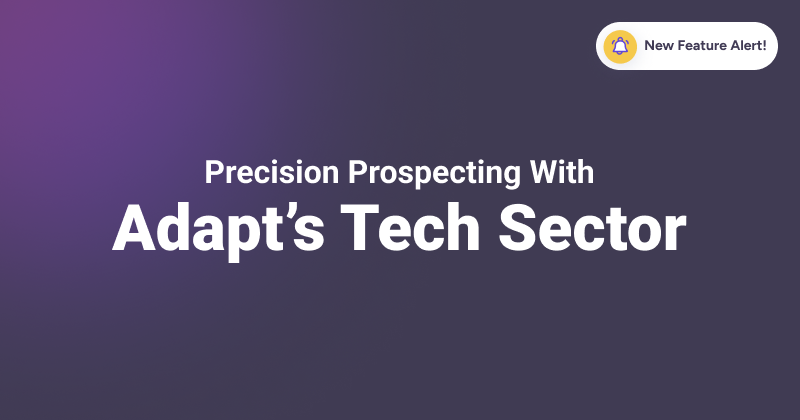On average, a sales rep spends almost 2/3rd of their working hours on:
- Follow-ups tasks
- Prospecting leads
- Reporting numbers
- And doing endless status updates with managers.
These tasks, comprising nearly two-thirds of their working hours, can be easily automated. The adoption of AI technology has emerged as a game-changer, allowing sales professionals to save approximately 2 hours and 15 minutes daily.
This newfound time translates into a valuable opportunity for sales reps to focus on their core responsibility: selling. As AI reshapes the sales landscape, C-suite leaders are actively exploring ways to adapt and maximize its potential.
In this article, we will explore the profound impact of AI adoption in B2B sales, delving into its benefits, challenges, and the varied opportunities it presents for businesses.
What's possible? - Benefits of using AI in B2B sales
The B2B buyer journey has evolved. Businesses have become more cautious with their finances and hesitant to purchase amid economic difficulty. Sales reps have to play the long game of building relationships that can bring more revenue later than generating quick wins.
This has led many sales teams to use AI tools to automate manual tasks, optimize sales processes, and help sales reps spend time connecting with prospects, building deeper relationships, and closing more deals.
Here is why you should be using AI in B2B sales –
1. Fuel your customer service with AI
AI helps with personalized communications by harnessing vast amounts of data to understand customer behavior, preferences, and needs at a granular level. These insights empower sales teams to send timely, relevant, and context-specific communications tailored to individual clients. AI-driven chatbots and virtual assistants can engage with customers in real-time, providing personalized product recommendations and addressing queries promptly.
2. Spend more time selling
Sales reps are the people who need the most help. They’re constantly searching for leads, making cold calls, and catching up with prospective clients. That amount of workload will require reprioritization, delegation, and multitasking, and even then, it might seem like nothing moving.
The major reason why AI became popular among sales reps is when they realized they were spending most of their time on low-impact, repetitive work instead of channeling their creative minds into client management, prospecting, and deepening work relationships.
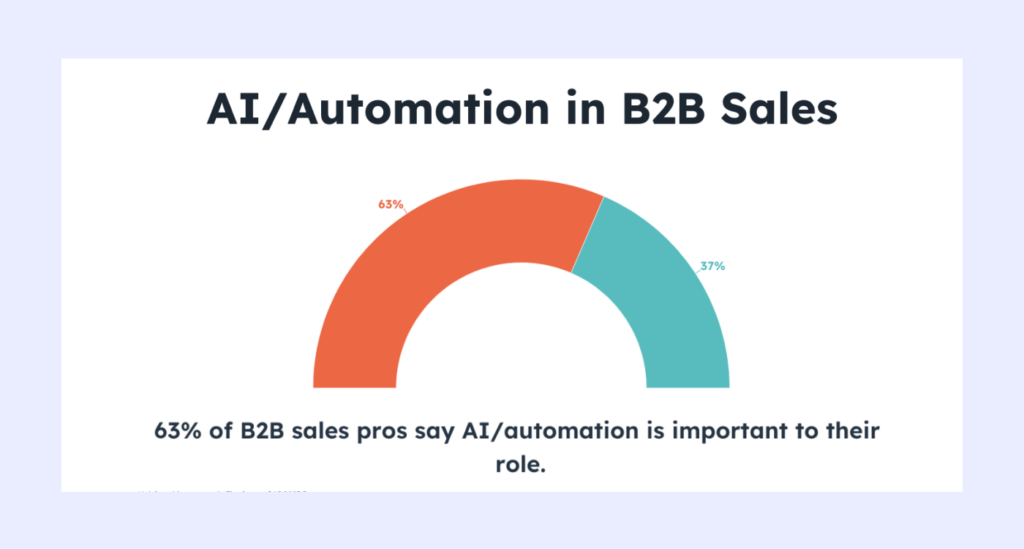
3. Boost sales process efficiency with AI
AI adoption has significantly impacted businesses, and 2/3rd of them plan to increase their AI investment over the next three months. In the latest McKinsey report, 41% of organization has seen a decrease in cost, and 65% of them saw an increase in revenue after AI adoption in marketing and sales.
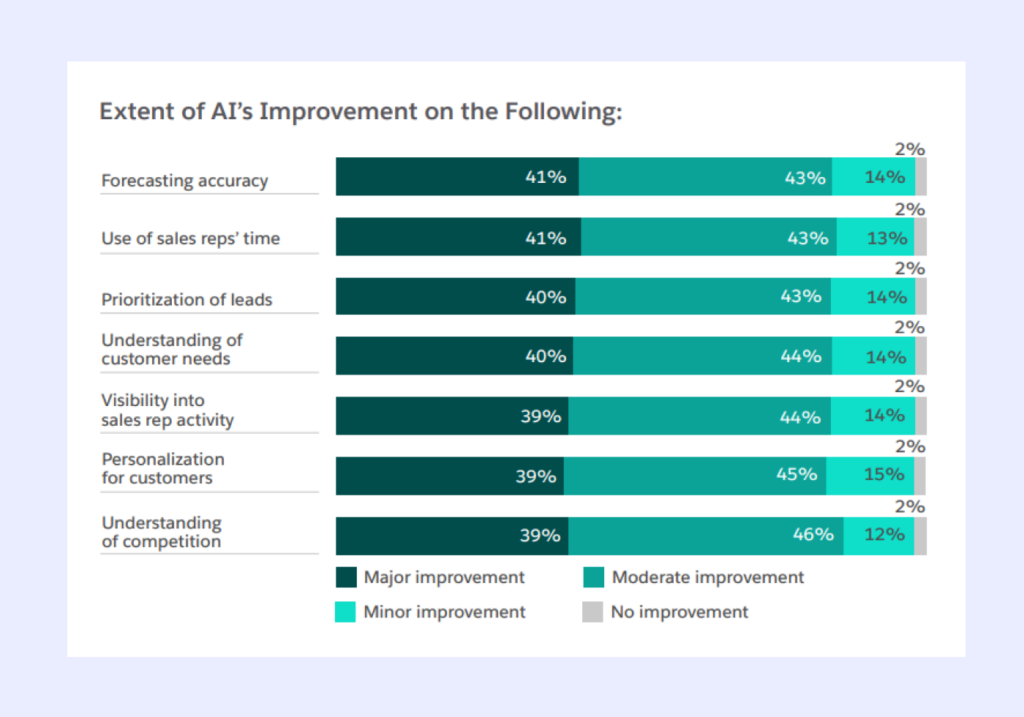
High-performing teams have already embraced AI and have seen enormous benefits in everything from prospecting to lead prioritization and accurate forecasting. AI is changing B2B sales in the most positive way possible, and many potentials are still yet to be uncovered.
4. Make better decisions using AI
Beyond automating tasks, AI can help you make better decisions that even large organizations struggle with. AI can analyze historical sales data, customer behavior, and market trends to make accurate buying predictions so that your team can focus on high-potential prospects that are more likely to convert into customers.
AI also helps with sales forecasting, content recommendation, sentiment analysis, sales performance analysis, and competitor analysis to provide B2B businesses with an ecosystem of information that makes decision-making easier.
Unpacking the AI opportunities across sales teams
B2B sales teams should look at AI tools as new team member who needs time to understand the business and its assigned work. The efficiency of AI tools depends on what purpose you are using them for and how well you can integrate it into your sales process.
According to Hubspot, most businesses use AI tools that automate manual tasks, offer data-driven insights, and help in outreach and customer experience.
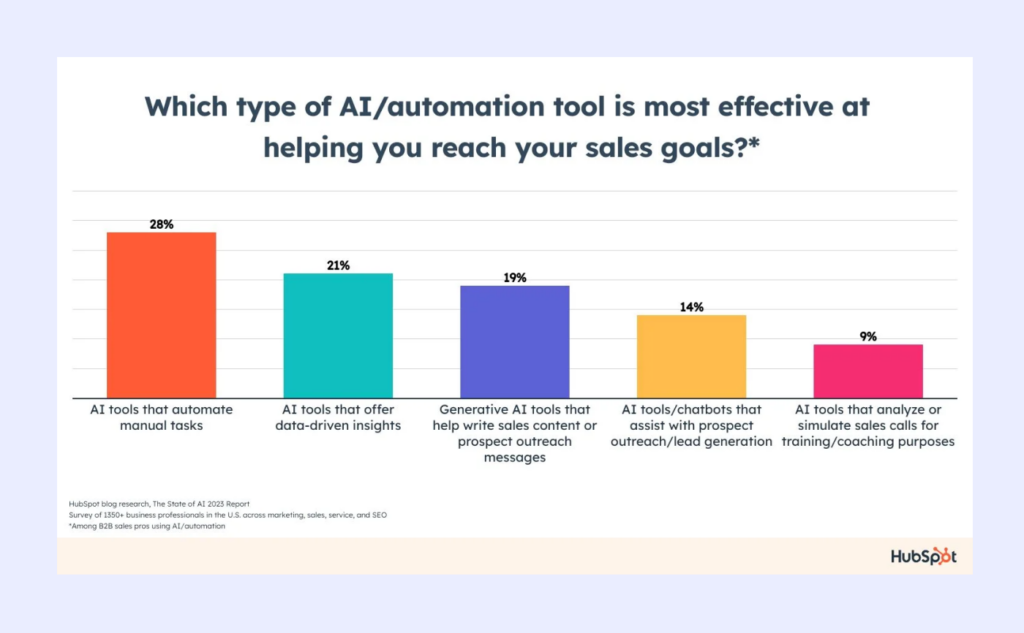
A recent Zensar’s AI report divides AI-use cases into three types:
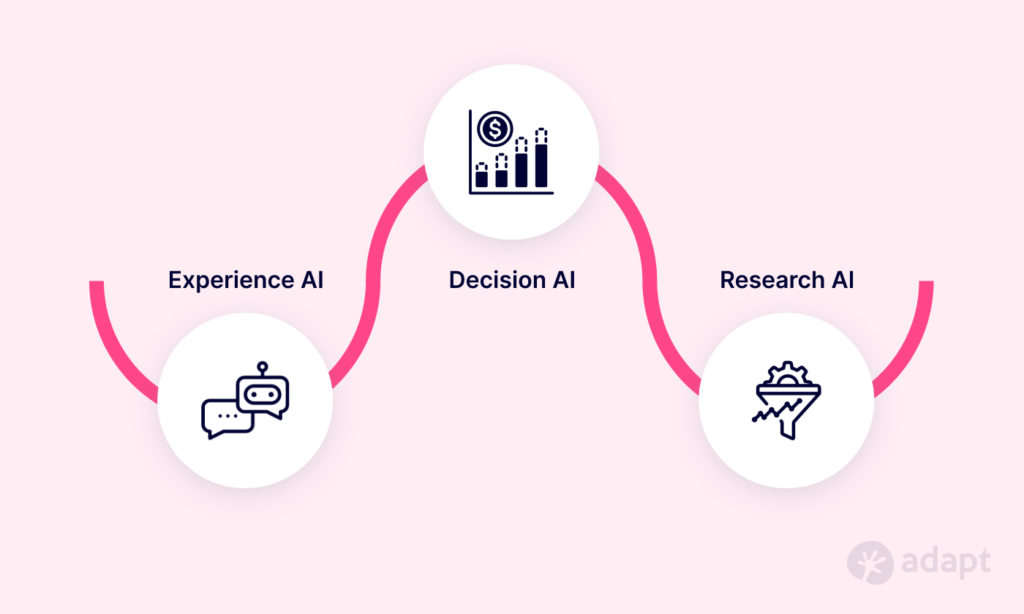
- Experience AI
- Decision AI
- Research AI
Let’s discuss these use cases in detail-
1. Experience AI
Experience AI tools enrich the sales team through prediction and automation to provide hyper-personalized information about prospective customers. Some use cases of experience AI are-
- Sales chatbot: A chatbot on your website helps to assist visitors with pricing information, product inquiries, and technical support. By using machine learning and natural language processing (NLP) algorithms, a chatbot can answer a wide range of questions accurately to potential clients, leading to high conversions.
- Targeting and segmentation: AI can segment customers 100X faster than humans. The AI algorithm can process massive amounts of customer data to identify trends that uncover hidden customer insights that human analysts might miss.
- Deal optimization: AI can help B2B sales reps determine the best pricing and deal structures based on historical sales data, customer preferences, and market trends for each client. Customized plans result in higher customer satisfaction and increased profitability of the business.
2. Decision AI
Decision AI supports core processes and functions by using machine learning and advanced analytics to deploy enterprise bots, adaptive applications, and testing automation. Some use cases of decision AI for B2B are-
- Lead scoring: AI can help sales reps analyze large volumes of data to prioritize leads based on their conversion likelihood. The algorithm gives you complete data about the prospect and its business activities. This allows sales reps to develop a tailored solution and help them close more deals.
- Sales forecasting: The AI algorithm can predict the overall sales performance for a specified period of time by analyzing historical sales data, external factors and market trends. It can provide information about the industry, competitive landscape, economic conditions, and other factors that impact a company’s sales performance.
- CRM data analysis: AI can help automate data enrichment processes in your CRM, identify inaccuracies, and provide insights to your sales team. This will save sales reps tons of hours of feeding data into the CRM and focus their time on selling.
3. Research AI
Research AI defines new AI applications and identifies new challenges that can be tackled through artificial intelligence. This segment focuses on creating better business AI opportunities and discovering its full potential.
- Sentiment analysis: It tracks an audience’s opinions, emotions, and attitudes about the brand. The goal is to understand personalized buyer needs and tailor your strategy to fulfill them quickly.
- Account-based marketing: ABM employs sales reps to identify high-value accounts based on previous engagement with marketing content, interaction with reps or firmographic data. This way, you can improve the delivery of personalized emails, marketing content, and chatbot interactions.
- Sales process optimization: The AI system collects data on sales activity to understand where sales reps spend most of their time. It allows them to benchmark their performance against top reps, analyze why deals are stuck, and other possible courses of action to optimize the sales process.
How B2B data platforms can empower AI sales use cases?
Leveraging AI has become indispensable for staying ahead of the curve. AI works well when fueled with accurate data and real-time data, enabling predictive analytics, personalized marketing, efficient lead qualification, and more. With on-demand access to accurate and comprehensive data at scale, data platforms redefine the landscape of data-driven decision-making. Let’s see how
1. Comprehensive lead insights:
B2B data platforms aggregate vast amounts of business data, providing comprehensive insights into buyers’ firmographic, technographic, and intent data. AI algorithms can analyze this data to identify trends, enabling sales teams to target prospects more effectively.
2. Lead Scoring and Qualification:
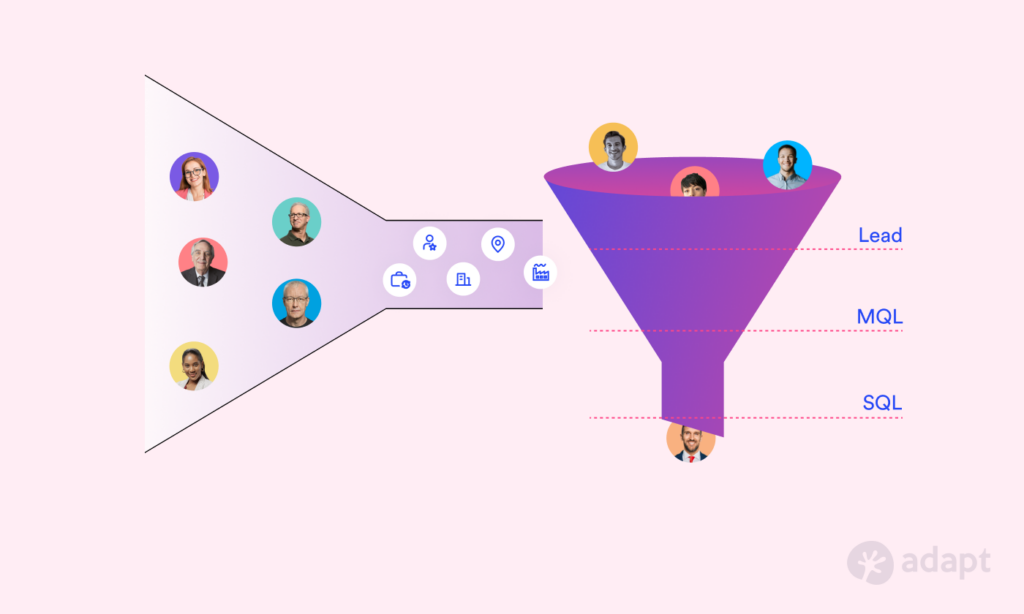
B2B data platforms, coupled with AI, enable automated lead scoring. AI algorithms analyze data to identify promising leads based on various criteria. This automation saves time for sales teams, allowing them to focus on high-potential prospects.
3. Personalized Marketing:
AI, fueled by B2B data, facilitates hyper-personalized marketing campaigns. AI can recommend tailored messaging by understanding buyer data parameters enhancing customer engagement and conversion rates.
4. Sales Forecasting:
B2B data platforms also provide firmograhic data and historical sales data. AI algorithms can analyze this data alongside various external factors (such as market trends or economic indicators) to generate accurate sales forecasts.
5. Customer Relationship Management (CRM):
B2B data platforms integrate seamlessly with CRM systems, enriching customer profiles with up-to-date information. AI-driven CRM systems analyze this data to provide sales teams with valuable context, helping them tailor their interactions and improve customer satisfaction.
6. Sales Process Optimization:
AI analyzes data from B2B platforms to identify bottlenecks or inefficiencies in the sales process. By pinpointing areas for improvement, businesses can streamline their processes, reducing costs and increasing overall sales efficiency.
There is a symbiotic relationship between B2B data platforms and AI; sales teams gain the ability to predict sales pipeline, enhance customer relationships, optimize messaging, and streamline sales processes, ultimately driving higher revenues and ensuring long-term success.
Leveraging Adapt Data OS to support Sales AI
Adapt Data OS is an all-in-one solution for enterprises to access data on demand and at scale. It provides a unified platform for data management for large scale B2B data needs. Its real-time capabilities empower businesses with timely, accurate data delivery while robust data intelligence solutions enable structured, secure, and compliant data access.
Here’s how Data OS can fuel data to your AI systems:
- Providing on-demand access for high-volume prospecting through API
- Enabling auto enrichment for large-scale data systems through API
- Empowering your products with data integration with on-demand B2B data
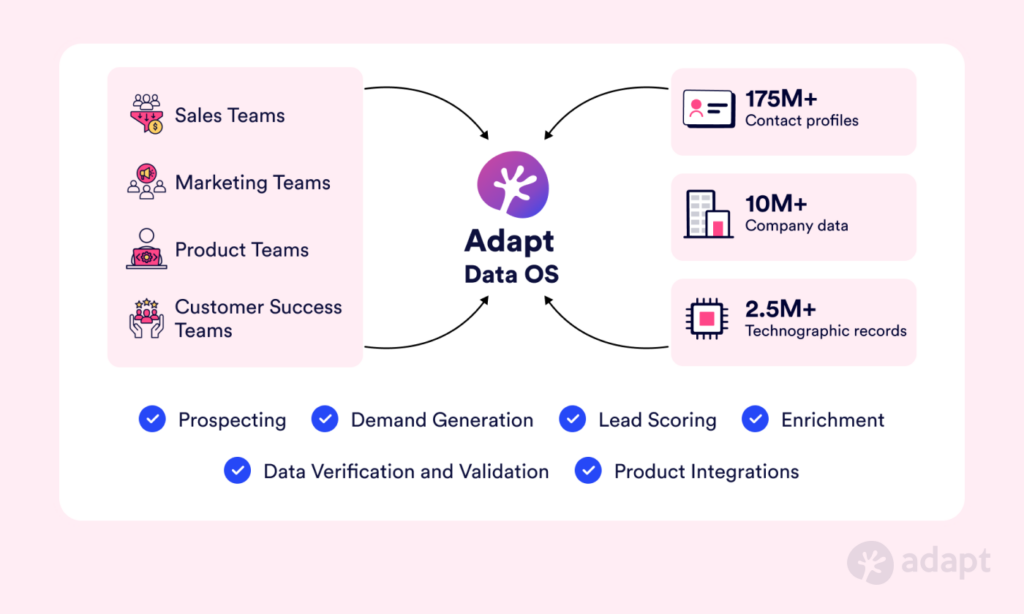
What’s the hesitation for implementing AI for B2B sales?
Despite the enormous growth of AI, many businesses are still struggling to scale their AI efforts.
“More than half of the successful artificial intelligence pilots never make it to the deployment stage; thus, data and analytics leaders struggle to capture value from their AI investments.” (Gartner)
According to McKinsey’s latest AI adoption report, the biggest challenge to AI adoption is the lack of strategy, resources and functional silos.
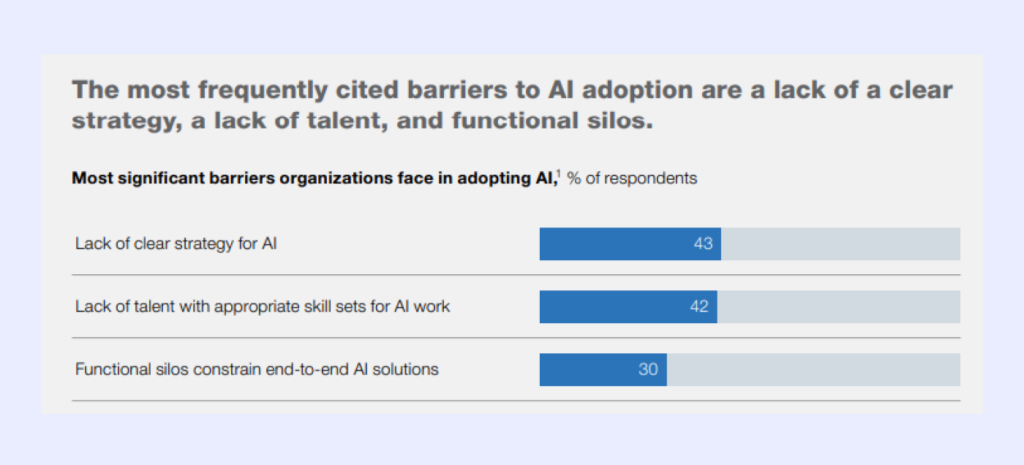
The adoption of AI in B2B sales faces several hesitations and challenges:
1. Complexity and Understanding:
Many businesses, especially smaller ones, might not fully grasp how AI works or how it can benefit their specific sales processes, leading to hesitancy in adopting the technology. Additionally, integrating AI systems with existing sales tools and processes can be complex and time-consuming, deterring businesses from making the switch.
2. Data Privacy and Security:
B2B sales involve sensitive data, and businesses might be hesitant due to concerns about data privacy, especially with the increasing focus on regulations like GDPR. AI systems, if not properly secured, can be vulnerable to cyber threats. To help with this, using a DSAR platform can help businesses manage their data privacy compliance and adhere to the law. Businesses are cautious about potential security breaches and the implications for their sensitive sales data.
3. Cost and ROI Uncertainty:
Implementing AI systems involves significant initial costs, including software, hardware, and training. Some businesses might find this investment daunting, especially without a clear understanding of the expected return on investment (ROI). Predicting the exact impact on sales metrics can be challenging. Businesses may hesitate if they’re uncertain about the direct correlation between AI implementation and increased revenue.
4. Skilled talent and workforce Concerns:
There is fear among sales professionals that AI might replace certain roles or tasks, leading to job displacement. This concern can lead to resistance from the workforce. Integrating AI requires training the existing workforce. Companies might be hesitant due to the time and resources needed for upskilling employees.
Top 3 areas where GenAI can change B2B sales
GenAI, with its ability to interpret vast volumes of data and facilitate nuanced interactions, is revolutionizing how businesses engage with clients, manage teams, and strategize for the future. Let’s delve into these top three areas where GenAI is reshaping the B2B sales landscape,
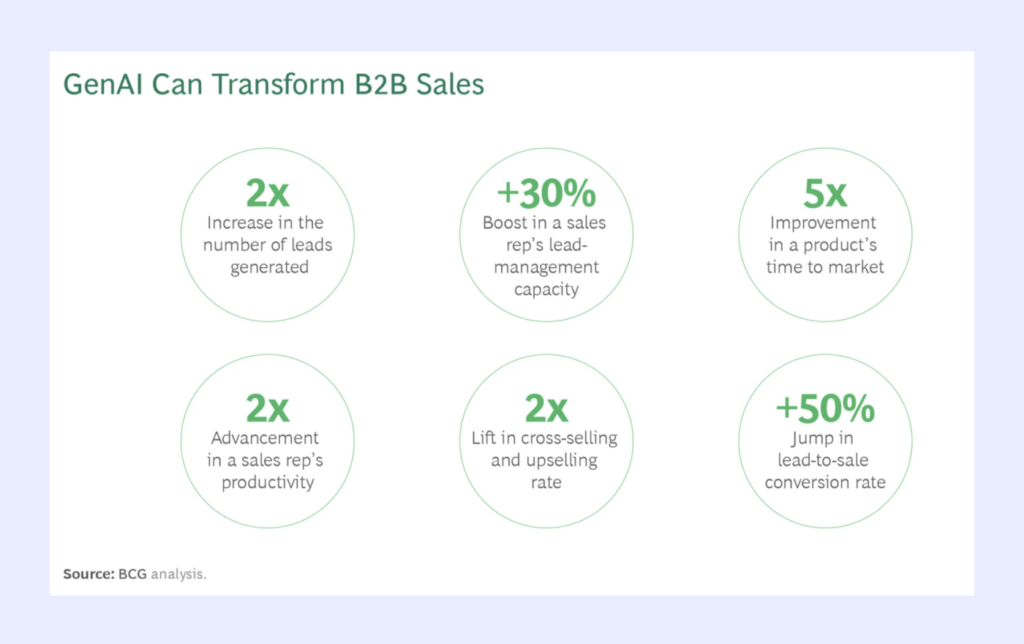
1. Automating administrative tasks:
AI is transforming B2B sales by automating time-consuming administrative tasks like drafting emails and managing CRM data. By handling these routine duties, AI takes away sales teams administrative burdens, enabling them to concentrate on strategic initiatives, ultimately enhancing productivity and efficiency.
2. Enhancing customer interactions:
AI-driven systems enhance customer interactions by offering personalized content and product recommendations, derived from in-depth analysis of customer preferences across emails, conversations, and social media. Generative AI, by interpreting nuanced language and subtle cues, provides accurate suggestions. Its interactive feature enables real-time collaboration with salespeople, refining recommendations as interactions unfold.
3. Empowering Sales managers:
GenAI is reshaping both frontline sales and managerial roles. By integrating with reporting systems, it enables forward-looking analysis, allowing managers to ask specific questions and provide targeted coaching feedback. Complex tasks like sales planning and key account strategy are now accomplished rapidly, empowering managers to make informed decisions and drive sales strategies effectively.
Will AI replace B2B sales?
While the idea of AI replacing human efforts in sales may evoke mixed feelings, it’s crucial to recognize AI as a supportive tool. AI serves as a potent ally, liberating sales reps from tedious tasks and allowing them to concentrate on critical matters requiring their expertise.
AI is not likely to replace B2B sales entirely, but it will significantly transform the way sales teams operate. AI technologies, including GenerativeAI, machine learning and natural language processing, can automate repetitive tasks, analyze vast amounts of data for insights, and enhance customer interactions.
While AI can handle routine processes, human sales professionals will continue to play a crucial role in building relationships, understanding complex client needs, and providing personalized solutions. The synergy of AI and human expertise is expected to redefine and optimize the B2B sales process, rather than completely replace it.
The objective isn’t to substitute the sales team but to leverage AI for its strengths: analyzing extensive data and uncovering vital insights, a process that could take humans days to accomplish. Are you ready to fuel your AI strategy with the right data? Connect with our growth expert and see how Adapt can help you scale.
